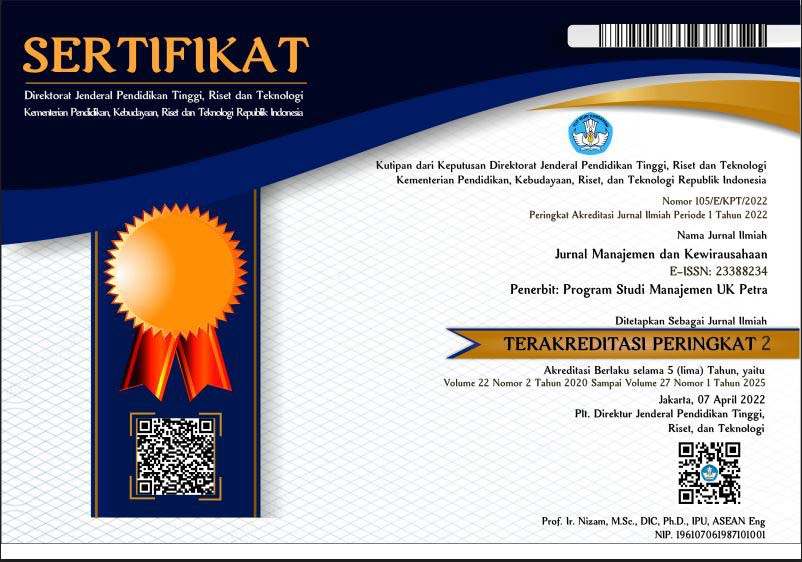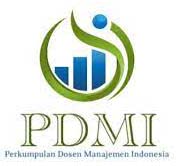RELATIONAL BENEFIT, KEPUASAN, DAN LOYALITAS PELANGGAN PADA BENGKEL PT HONDA DEWATA MOTOR
 :
:
https://doi.org/10.9744/jmk.17.1.11-20
Keywords:
Relational benefits, customer satisfaction, customer loyaltyAbstract
Providing customer satisfaction consistently could make customers become loyal to the company. Loyal customers were the source of income and they would help the company to survive in the business competition. Relationship marketing was a strategy that can be used to achieve these goals, through relational benefits strategy. The company could give the benefit from relationship between companies and customers. This study analyzed relationship marketing in the workshop of PT Honda Dewata Motor through 153 respondents. The results show that confidence benefits and social benefits have positive effect on customer satisfaction. Special treatment benefits had no significant effect on customer satisfaction and loyalty to workshop. Customer satisfaction had positive impact to customer loyalty significantly.
References
Alrubaiee, L., & Nahla, A. N. (2010). Investigate the impact of relationship marketing orientation on customer loyalty: The customer's perspective. International Journal of Marketing Studies, 2(1), 155–174.
Amonini, C., McColl-Kennedy, J. R., Soutar, G. N., & Sweeney, J. C. (2010). How professional service firms compete in the market: An exploratory study. Journal of Marketing Management, 26(1), 28–55.
Ardyansyah. (2007). Pengaruh relational benefit dan relationship quality pada relational outcomes di PT ESC Indonesia. Tesis. Yogyakarta: Program Magister Manajemen UGM Yogyakarta.
Delcourt, C., Gremler, D. D., Van Riel, A. C. R., & Van Birgelen, M. (2013). Effects of perceived employee emotional competence on customer satisfaction and loyalty. Journal of Service Management, 24(1), 5–24.
Dimitriadis, S. (2010). Testing perceived relational benefits as satisfaction and behavioral outcomes drivers. International Journal of Bank Marketing, 28(4), 297–313.
Eisingerich, A. B., & Bell, S. J. (2006). Relationship marketing in the financial service industry. Journal of Financial Service Marketing, 10(4), 86–97.
Ferdinand, A. (2002). Structural equation modeling dalam penelitian manajemen aplikasi model-model rumit dalam penelitian untuk tesis magister & disertasi doktor. Semarang: BP UNDIP.
Gaur, S. S., Xu, Y., Quazi, A., & Nandi, S. (2011). Relational impact of service providers’ interaction behavior in healthcare. Managing Service Quality: An International Journal, 21(1), 67–87.
Hennig-Thurau, T., Gwinner, K. P., & Gremler, D. D. (2002). Understanding relationship marketing outcomes: An integration of relational benefits and relationship quality. Journal of Service Research, 4(3), 230–247.
Hurriyati, R. (2005). Bauran pemasaran dan loyalitas konsumen. Bandung: Alfabeta.
Kau, A. K., & Elizabeth, W. Y. L. (2006). The effect of service recovery on satisfaction: A comparison between complaints and non-complaints. Journal of Service Marketing, 20(2), 101–111.
Kim, H. D. (2005). The relationships between service quality, customer satisfaction, and repurchase intention in Korean private golf courses. Retrieved on April 1, 2014 from http://gradworks.umi. com/31/77/3177086.html.
Kinard, B. R., & Capella, M. L. (2006). Relationship marketing: The influence of consumer involvement on perceived service benefits. Journal of Services Marketing, 20(6), 359–368.
Kotler, P. (2006). Manajemen pemasaran. Edisi ke-sebelas. Jilid II. Jakarta: Indeks Kelompok Gramedia.
Leverin, A., & Liljander, V. (2006). Does relationship marketing improve customer relationship satisfaction and loyalty? International Journal of Bank Marketing, 24(4), 232–251.
Macintosh, G., & Lockshin, L. S. (1997). Retail relationship and store loyalty: Multilevel perspective. International Journal of Research in Marketing, 14(5), 487–497.
Maria-Eugenia, M., Gil-Saura, I., & Berenguer-Contri, G. (2009). Relational benefits and loyalty in retailing: An intersector comparison. International Journal of Retail & Distribution Management, 37(6), 493–509.
Molina, A., Martin-Consuegra, D., & Esteban, A. (2007). Relational benefits and customer satisfaction in retail banking. International Journal of Bank Marketing, 25(4), 253–271.
Navarro, M. M., Iglesias, M. P., & Torres, P. R. (2004). The benefits of relationship marketing for the customer and for the fashion retailers. Journal of Fashion Marketing and Management, 8(4), 425–436.
Ndubisi, N. O., & Chan, K. W. (2005). Factorical and discriminant analyses of underpinnings of relationship marketing and customer satisfaction. International Journal of Bank Marketing, 23(7): 542–557.
Palmatier, R. W., Dant, R. P., Grewal, D., & Evans, K. R. (2006). Factor the influencing the effectiveness of relationship marketing: A meta analysis. Journal of Marketing, 70, 136–153.
Prayustika & Adriani, P. (2010). Pengaruh manfaat relasional dan kualitas hubungan pada hasil pemasaran relasional di Bali Beach Golf Course, Tesis. Bali: Program Magister Manajemen Universitas Udayana Bali.
Semadi, L. P. S. W., Suprapti, N. W. S., & Nurchaya, K. (2010). Pengaruh manfaat relasional terhadap kepuasan dan loyalitas nasabah bank (Studi kasus pada Bank BPD Bali cabang utama Denpasar). Bali: Program Magister Manajemen Universitas Udayana Bali.
Solimun (2005). Structural equation modeling. Surabaya: Universitas Katolik Widya Mandala.
Sugiyono (2009). Metode penelitian bisnis. Cetakan Kesepuluh. Bandung: CV Alfabeta.
Vincent, N. A., & Cynthia, M. W. (2013). Exploring relationship marketing in membership associa-tions. European Journal of Marketing, 47(10), 1622–1640.
Yen, H. J. R., & Gwinner, K. P. (2003). Internet retail customer loyalty. Journal of Service, 14(5), 483–500.
Yen, T. F., Liu, H. H. J., & Tuan, C. L. (2009). Managing relationship effort to influence loyalty: An emperical study on the sun link sea forest and recreational park, Taiwan. The International Journal of Organizational Innovation, 2(2), 179–194.
Zheithaml, V. A., Bitner, M. J., & Gremler, D. D. (2006). Service marketing: Integrating customer focus across the firm. 4th Edition. New York: McGraw Hill.
Downloads
Published
How to Cite
Issue
Section
License
Authors who publish on this journal agree to the following terms:
- Authors retain copyright and grant the journal right of first publication with the work simultaneously licensed under a Creative Commons Attribution License that allows others to share the work with an acknowledgement of the work's authorship and initial publication in this journal.
- Authors are able to enter into separate, additional contractual arrangements for the non-exclusive distribution of the journal's published version of the work (e.g., post it to an institutional repository or publish it in a book), with an acknowledgement of its initial publication in this journal.
- Authors are permitted and encouraged to post their work online (e.g., in institutional repositories or on their website) prior to and during the submission process, as it can lead to productive exchanges, as well as earlier and greater citation of published work (See The Effect of Open Access).

















